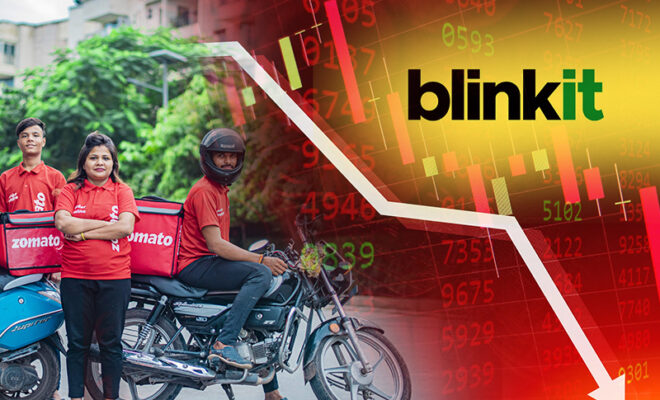Zomato Drops 14% In Just 2 Days After Blinkit Acquisition

Zomato (online food delivery platform) acquired Blinkit (a commerce delivery firm) for ₹4,447.5 crore. But analysts predict that it’s an unworthy expensive deal.
Zomato’s stock continued to fall on Tuesday, falling 7.5% to a drop of ₹ 61 per share on the BSE. Since the acquisition of Blinkit, a company that specializes in rapid commerce, was revealed, the price has dropped 14% in just two days.
Also Read: Top 10 Most Expensive Stocks In India In 2022
The business announced its weekend purchase of loss-making company Blinkit at Rs 4,447 crore. The payment will be made by issuing approximately 629 million Zomato shares (diluting equity by approximately 6.88 percent on a total equity basis) at the specified preferred allotment price of ₹70.76 and purchasing Hands on Trades Pvt Ltd for ₹60.7 crore in cash.
The transaction prices Blinkit (EV basis) at $750 million (Rs 5,860 crore), less than the $1.1 billion in August 2021 (after taking into account the incremental ESOP pool formed).
Kotak Institutional Equities claims,
“Although the firm has reduced the originally paid valuation by a small amount, we still think Blinkit needs an additional $250 million in investment, which may be made over the course of FY23 to FY24. Zomato will now have invested $1.05 billion in Blinkit overall.”
With Zomato itself going at 13x FY22 P/S, Edelweiss Securities agreed that the takeover at 21x FY22 price-to-sales (P/S) is a pricey investment.
With firms like Reliance Retail (through Dunzo), Tata’s BigBasket, Swiggy’s Instamart, and Flipkart’s Rapid existing in the area, analysts predict fierce rivalry in the quick commerce over FY 23–25.
Also Read: Top 8 Stock Market Crashes In India Till Date (Updated 2022)
Punit Patni, an analyst for equity research at Swastika Investmart, remarked,
“It is anticipated that Zomato Ltd.’s acquisition of Blinkit, which was just announced, will worsen its predicament of significant operational losses.
It will take many years to discover the fundamental economics and become successful in the highly competitive rapid commerce industry.
Additionally, the current markets do not favor companies that are expanding without generating profits.”



